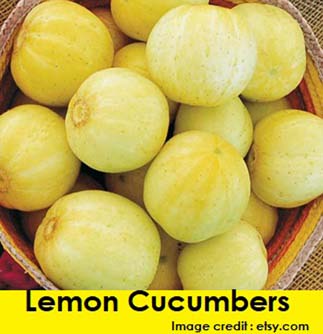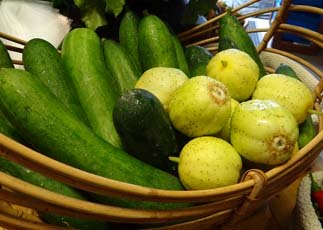Lemon cucumbers
Lemon cucumbers are spherical-shaped and yellow vegetables in the Cucurbitaceae family. They do not have a lemon taste but only have the appearance in shape and color. They have thin, tender skin with a flavor a little milder than a regular cucumber.
Botanically, lemon cucumbers belong to the large Cucurbitaceae family and are related to squashes, melons, and gourds.
Scientific name: Cucumis sativus.
 |
Lemon cucumbers are one of the six cultivar varieties of cucumbers. Other widely grown varieties are gherkins, Armenian (C. m. var. flexuosus), English (Greenhouse), Persian, and oriental cucumbers.
Lemon cucumbers fall into the category of slicing (table) cucumbers, unlike gherkins and Kirby, which are preferred for pickling.
They differ from other elongated types of mainstream cukes such as English cucumbers. Lemon cukes differ in being round/spherical. The skin is yellow-pigmented, and smooth, with small horns over the surface.
Lemon cucumber has similar growth requirements as any other Cucurbits. It grows well in sandy loam soil rich in organic matter and adequate moisture. Sow after the last frost when the soil temperature is over 70ºF. Trellising support quickly establishes the crop, minimizing fungal attacks.
After about 45 days of seedling, the plant produces small, round, light green fruits with spiny surfaces. You can harvest them at the tender stage when the seeds are soft, and the flesh is crunchy and juicy. Mature cucumbers turn golden-yellow, and seeds tend to become chewy and hard.
The inner flesh is pale green to yellow with edible seeds and has a mild, sweet taste with a cool, crisp texture.
Health Benefits of Lemon cucumber
Lemons are low in cucurbitacin, a naturally occurring terpenoid toxin that accounts for the bitter flavor in other varieties of cucumbers. Their quality of thin skin and lack of bitterness qualifies them as a “burpless” variety.
It is one of the very low-calorie, moisture-rich vegetables; provides just 12 calories per 100 g and plenty of water and electrolytes. Besides, it contains no saturated fats or cholesterol.
Lemon cucumber is a good source of soluble and insoluble dietary fiber. Roughage in the diet helps reduce constipation problems and offers some protection against colon cancers by eliminating toxic compounds from the gut.
These are an excellent source of potassium, an important intracellular electrolyte. 100g of cucumber provides 136 mg of potassium but only 2 mg of sodium. Potassium is a heart "friendly" electrolyte that helps in reducing total blood pressure and heart rate by countering the pressing effects of sodium.
Lemon cucumbers contains unique antioxidants in moderate ratios such as ß-carotene and α -carotene, vitamin-C, vitamin-A, zeaxanthin, and lutein. These compounds help act as protective scavengers against oxygen-derived free radicals and reactive oxygen species (ROS) that play a role in aging and various disease processes.
Their total antioxidant strength, measured in terms of oxygen radical absorbance capacity (ORAC value), is 214 µmol TE/100g.
Lemon cucumbers have mild diuretic properties, which are perhaps attributed to their free water, high potassium, and low sodium content. It helps in checking weight gain and high blood pressure.
They have a significant amount of vitamin-K, providing about 7.2 µg per 100g. Vitamin K improves bone strength by promoting osteoblastic (bone mass-building) activity. It also has a proven role in the treatment of Alzheimer's disease by limiting neuronal damage.
| Principle | Nutrient Value | Percent of RDA |
|---|---|---|
| Energy | 12 Kcal | <1% |
| Carbohydrates | 2.16 g | 1.6% |
| Protein | 0.59 g | 1% |
| Total Fat | 0.16 g | 0.75% |
| Cholesterol | 0 mg | 0% |
| Dietary Fiber | 0.7 g | 2% |
| Vitamins | ||
| Folates | 14 µg | 3.5% |
| Niacin | 0.037 mg | <1% |
| Pantothenic acid | 0.259 mg | 5% |
| Pyridoxine | 0.051 mg | 4% |
| Riboflavin | 0.025 mg | 2% |
| Thiamin | 0.031 mg | 2.5% |
| Vitamin A | 12 IU | <1% |
| Vitamin C | 3.2 mg | 5% |
| Vitamin E | 0.03 mg | 0% |
| Vitamin K | 7.2 µg | 6% |
| Electrolytes | ||
| Sodium | 2 mg | 0% |
| Potassium | 136 mg | 3% |
| Minerals | ||
| Calcium | 14 mg | 1.4% |
| Iron | 0.22 mg | 3.5% |
| Magnesium | 12 mg | 3% |
| Manganese | 0.079 mg | 3.5% |
| Phosphorus | 21 mg | 3% |
| Zinc | 0.17 mg | 1.5% |
| Phyto-nutrients | ||
| Carotene-ß | 31 µg | -- |
| Crypto-xanthin-ß | 18 µg | -- |
| Lutein-zeaxanthin | 16 µg | -- |
Selection
Fresh lemon cucumbers are summer crops in the U.S. Find them in farmer's markets, and oftentimes in supermarkets from mid-June till the end of September.
 |
| Lemon cucumbers with other varieties in a market. Courtesy: eatstayfarm |
Look for spherical to oval-shaped, tennis-ball size fruits, averaging 5-7 centimeters in diameter and often having a small protrusion at the blossom end.
Do not buy over-mature, big-size fruits as they are out of flavor.
Storage
At home, store them inside the cold compartment/crisper drawers for extended use. They will keep up to three days when stored in the refrigerator at a relative humidity of 95%.
Preparation and serving methods
At home, clean them in running water to rid of any remains of surface sand and pesticides. Just give a hand scrub to remove surface spines. Dry mop using a clean towel or cloth paper.
Slice/dice them as you desire in the recipes.
Here are some serving tips:
Add lemon cucumber cubes to salads. They can be a great substitution for other green cucumbers in salads/appetizers.
Diced or whole, it can be enjoyed alone or with salt and pepper seasonings.
Small cubes/wedges add zest to fresh tomato, green salads, bean, or tofu/cheese salads.
In Mexico, lemon cucumbers are juiced and used in agua frescas and cocktails.
In India, a close relative of lemon cucumber is known as dosakaya. This ovate sambar vegetable cucumber is employed in a variety of savory recipes with other vegetables and lentils in curries and stews.
Safety profile
Lemon cucumbers compose very small amounts of terpenoid toxic compounds such as cucurbitacin B, D, G, H, etc. Hence, they have been categorized as burpless variety, meaning they lack bitter flavor components and are easily digestible.
However, to be on the safer side, always taste a small slice of cucumber before eating the whole fruit to ensure that it is not bitter. If found so, the whole fruit should be discarded. In case of discomfort after consumption (nausea, vomiting, diarrhea, or any feeling of uneasiness), one should be immediately taken to any nearby hospital for medical attention. (Medical disclaimer).
≻≻-Back to Vegetables from Lemon cucumber nutrition. Visit here for an impressive list of vegetables with complete illustrations of their nutrition facts and health benefits.
≻≻-Back to Home page.
Further Resources:
Cucumber- Harvest of the Month.
Lemon cucumbers-Specialty produce.
Stanford School of Medicine Cancer information Page- Nutrition to Reduce Cancer Risk.
.